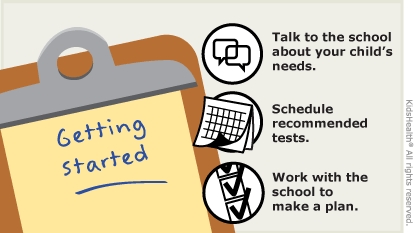Public schools and some private schools can provide services (such as tutoring, extra time for testing, or physical or occupational therapy) to help all students thrive at school. Someone who has trouble learning or other special needs because of a disability or a chronic (long-term) illness or health condition can benefit from these services. Here's how to work with your child's school to make sure they get the support they need.


Talk to the school about your child's needs. Set up a meeting with your child's teacher, school counselor, or principal. Tell them about your child's needs. If your child has a long-term illness, share a care plan from your health care provider. This plan should explain any medicines, special foods, activity limits, and warning signs that your child needs medical help.
Schedule recommended tests. The school might want to do testing to see how they can help your child, such as checking for speech or attention problems. Follow the school's instructions for scheduling.
Make a plan with the school. This may include making an IEP (Individualized Education Program) or a 504 plan. These are plans to identify your child's needs and create the supports that are required. Work with the school team to make sure the plan works for your child and family. Review the plan every year with the team. Keep a folder or a notebook with meeting notes, your health care provider's plans, and letters you've received about your child's services.
Make sure services are carried out. Services may include:


What is the difference between an IEP and a 504 plan? Both an IEP and a 504 plan can help your child thrive at school.
Who gets support from school? Students in public and some private schools can get accommodations or support services if they have limits on their abilities to:
What if I don't agree with my child's plan? If you don't agree with your child's plan or think it needs to be adjusted, you can ask for a meeting with your child's education team. Usually, the team can find a solution.